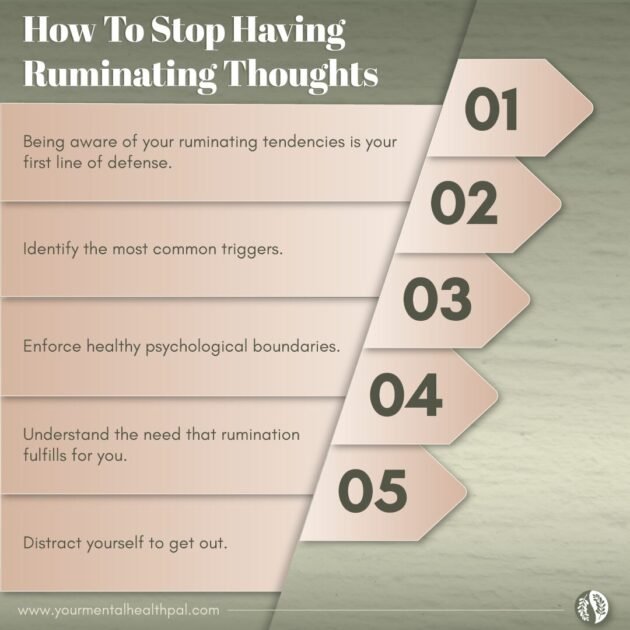It’s almost normal to spend time replaying negative incidents and outcomes in your life – that terrible work presentation you gave last month, yesterday’s fight with your partner, the performance evaluation coming up, and whatnot.
Replays of awkward incidents, embarrassing moments, and missed opportunities regularly keep us awake at night.
But when this self-reflection becomes obsessive and starts affecting your daily life – it’s called rumination in psychology, and it’s bad news!
Rumination in psychology is when you continuously go over the same – primarily negative – thoughts and beliefs repeatedly.
You constantly try to figure out why things didn’t work out as they should have. You rethink your role in all these situations, about what you could have done differently or what you can do now to fix stuff. It’s okay and pretty beneficial to do it once, but there’s no purpose or advantage in doing it again and again.
But that doesn’t stop you from ruminating and obsessing over the negatives, right?
No matter how much you try not to think about them, the thoughts are still there all the time, and you just can’t stop. They weigh you down, and you are unsure about how to end this vicious cycle.
Fortunately, there are ways. But first, we need to figure out what rumination in psychology is, how it manifests itself, and why it harms your mental health. Let’s get started.
What Is Rumination In Psychology?

Well, for starters, it’s a habit related to cows.
Sounds absurd, right? We are just getting started!
Rumination in psychology is derived from the habit of ruminating or ‘chewing over’ in cows. It is the process of how cows digest their food. Cows swallow their food after basic chewing, then regurgitate (bring it back to their mouth after swallowing) and chew again. While this works great for cows, humans usually chew over negative thoughts and emotions.
Therefore, rumination in psychology means to fixate or cling to upsetting thoughts and keep replaying them in your mind all the time.
According to research by Felipe E García and team, there are four types of rumination around stressful situations. These include:
- Reflection: the type that helps people come up with solutions.
- Deliberate: the one where you look at the incident through all possible perspectives to come up with a balanced point of view.
- Intrusive: the type in which you have obsessive and intrusive negative thoughts.
- Brooding: the one where you fall into a pattern of negative thoughts.
Reflective and deliberative forms of rumination in psychology are not deemed as bad. They might even be beneficial in helping you take lessons from different situations. But when your rumination process takes an intrusive or brooding form, it puts you on a hamster wheel of toxicity and overthinking, leading to terrible mental health outcomes.
How Does Rumination Affect You?
When we say rumination is terrible news, we aren’t playing around.
It is downright frustrating. It drains your energy, steals your time, and rarely does something good for you.
All it does is subconsciously reconfirm your cynicism. The more you think about these negative thoughts, the more reinforced your gloomy outlook becomes.
What’s worse?
By diverting your attention and draining your energy, rumination makes you an easy target for its close relatives, anxiety, depression, and a host of other mental health conditions.
Moreover, the effect is not just limited to your mind.
Replaying distressing thoughts in your head is almost like ripping off scabs from unhealed emotional wounds. This brings up all the pain and discomfort while flooding your body with stress hormones.
You can literally spend days dwelling on upsetting thoughts, and by constantly doing so, you put your body under extreme physical and emotional stress.
This has devastating consequences. It can make you more susceptible to substance abuse, eating disorders, and even heart-related conditions. This also hampers your cognitive functioning and eats away at your productivity.
And the more you engage in it, the harder it gets to stop.
Rumination can easily become a habit of thinking. It becomes extremely challenging to shift to other thoughts.
But What Causes These Ruminating Thoughts?
We have discussed what rumination in psychology is and how it affects you. But have you wondered where this habit actually begins? What causes rumination in the first place?
Well, the exact cause isn’t clear, but it’s mostly thought to be a stress response. When you are stuck in a stressful situation, rumination becomes an unhealthy but addictive coping mechanism. It makes you feel like you are problem-solving, but unfortunately you aren’t.
Additionally, it appears that there are a whole lot of different reasons why people have ruminating thoughts. These include:
- low self-esteem,
- external stressors (especially stigma-related stressors like race, sexual orientation, ethnicity, and gender),
- a history of traumatic experiences, etc.
Most people engage in ruminating thoughts every once in a while. However, they usually fade away with time. The problem begins when they become persistent and uncomfortable enough to affect your life.

Here’s What To Do When You Can’t Stop Ruminating
Now that we have covered the basics of what rumination in psychology actually is, it’s time to get to the ‘how’ of the problem. How do you stop ruminating thoughts?
For starters, even though your ruminating tendencies might make you feel hopeless, there is some good news here. There are practical solutions on how to stop ruminating thoughts, and they are pretty effective. Moreover, they are also much easier than you know!
Let’s dive in.
1. Being aware of your ruminating tendencies is your first line of defense.
As with all mental health-related issues, awareness always helps. Therefore, the first step in how to stop having ruminating thoughts is to recognize and red flag them.
Once you feel that any distressing thought has become negative, you need to catch it before it overpowers your sensible self.
This is pretty difficult because rumination can mask itself easily as a healthy reflection.
Healthy reflection is the ideal way to deal with anything stressful or adverse that occurs in your life. For instance, if you bombed a work presentation, it is important to analyze the factors that led to this. This way, you can effectively avoid being in such situations again.
The key differentiator between healthy reflection and rumination is that the former is productive. Rumination is also analytical, but it doesn’t lead to healthy outcomes.
So, if you want to learn how to stop having ruminating thoughts, be more sensitive when you cross the line from reflection to rumination.
2. Identify the most common triggers.
As we mentioned earlier, you can’t stop ruminating if you don’t know you are doing it in the first place. And it’s pretty damn difficult for people to figure out by themselves.
A good way to figure this out is to assess what triggered you in the past. Your list of triggers might include being around more competent or ambitious people, working with people you don’t really trust, making major financial decisions, etc. (You get the hint, right?)
3. Enforce healthy psychological boundaries.
The next step in how to stop ruminating thoughts is to put a mental distance between yourself and what’s triggering you.
For instance, you might feel that you are being unproductive and underachieving despite doing legibly well. A good way to put some psychological distance between yourself and this ruminating thought is to label what’s going on in your head as thoughts and feelings.
So rather than saying, “I’m inadequate,” or “I am an underachiever,” try saying, “I feel like I’m inadequate,” or “I currently feel like an underachiever.”
This might not sound like a meaningful change, but you’d be surprised by its impact.
4. Understand the need that rumination fulfills for you.
We all understand that rumination is bad. It’s a mental behavior that we consciously engage in. So, why do we keep coming back to it time and again?
Well, because it’s fulfilling some psychological need for you. These ruminating thoughts are doing something for you, even if you haven’t recognized it yet.
They are either making you feel more in control, feeding your need for certainty, or helping you believe that you are being a problem-solver. If you have been struggling with distressing thoughts for a while, asking yourself what needs they fulfill can be a great way to stop them.
5. Distract yourself to get out.
The trick on how to stop ruminating is to stop it as soon as you notice it.
Therefore, train your brain to be non-stick. As soon as you notice a trail of upsetting thoughts, distract yourself. Engage in something different for the next 10 minutes. Make sure that the activity demands your complete attention but is not too difficult. In some situations, just focusing on your current current work can help.
Conclusion:
Rumination in psychology is defined as the habit of obsessively engaging in negative thoughts and emotions. It’s harmful to both your mental and physical health. However, there are effective ways, like analyzing your triggers and creating a psychological distance from them, that’ll help deal with them better!
While most people might be able to learn how to stop ruminating thoughts with time, for others, it might not be a passing phase. If your ruminating thoughts start affecting your life, it is essential to get proper professional help.
Access to professional help is now easier than ever with the advent of online therapy platforms. To learn more about the top online therapy platforms, click here.
To continue learning about mental health daily, subscribe to Your Mental Health Pal.

